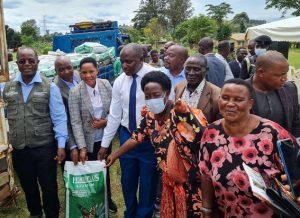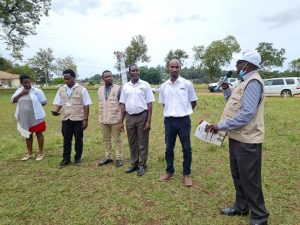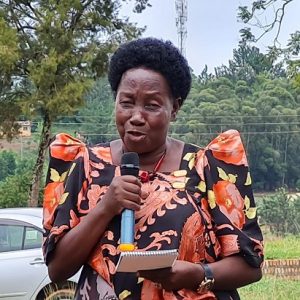Fred Bwino Kyakulaga, the Minister of State for Agriculture speaking at the launch of the fertilizer distribution programme in Masaka
Uganda Coffee Development Authority (UCDA) has delivered organic fertilizers to coffee farmers in Greater Masaka to boost productivity of stumped old and unproductive trees.
UCDA gave out 33,373 bags of Fertiplus fertilizer to coffee farmers in the districts of Masaka, Lwengo, Lyantonde, Bukomansimbi, Sembabule, Kyotera and Rakai which are famous for growing Robusta coffee.
According to UCDA, there are 2,452,830 verified stumped coffee trees in Greater Masaka.
Speaking at the the launch of the fertilizer distribution programme at the Ssaza Grounds in Masaka on Wednesday, Hon. Fred Bwino Kyakulaga, the State Minister for Agriculture, said the coffee fertilizer distribution programme for coffee rehabilitation will increase coffee production and productivity of the stumped trees not only in Greater Masaka, but across the country.
The Minister said Greater Masaka is one of the main Robusta coffee growing regions in Uganda with 266,281 households involved in coffee production.
“Unfortunately, most of the farms have old and unproductive coffee trees. A recent survey by UCDA has revealed that there are 6,343,941 of these old trees in Bukomansimbi, Kyotera, Rakai, Sembabule, Lwengo, Lyantonde, Kalungu, Masaka and Kalangala. My ministry, through UCDA is currently running a country-wide programme to rehabilitate (stump) old and underproductive coffee trees,” Bwino said.

Organic fertilizer distribution launched in Masaka.
He added: “This will increase their productivity and drive the sub sector to achieving its target of producing 20 million 60 kg bags of green coffee by 2025 which is in line with the Coffee Roadmap.”
The roadmap was developed in response to a directive issued in 2014 by President Yoweri Museveni, to accelerate coffee production from the then 3.5 million 60kg bags to 20 million bags.
Bwino said the coffee rehabilitation programme will demonstrate how old, unproductive coffee trees can be converted back to a highly productive state with the application of fertilizers.
“The Government-imported organic fertilizers we are distributing will provide essential nutrients that are needed to rejuvenate the rehabilitated coffee trees,” Bwino said.
The Minister also spoke about reports of farms that have been affected by the Black Coffee Twig Borer (BCTB), coffee wilt disease and the tailed caterpillar.
“Fortunately, the UCDA and the National Coffee Research Institute (NaCORI) in Kituza, are conducting research and supporting farmers with the right pesticides to mitigate the challenges. However, we urge farmers who are affected by these pests and disease to notify the extension officers in their areas for immediate control and management. It is important to work as a community to completely eradicate them,” Bwino said.
He also commended the farmers of the Greater Masaka region for the improved productivity that has been reported.
“The current village yield per tree per year is 1.7 kg of Fairly Average Quality (FAQ) coffee. This productivity is attributed to farmers who are planting more coffee and who are employing good agricultural practices. We implore farmers with coffee trees that are 8 years and older to stump them and to use fertilizer for increased productivity. This will enable them to reach the target yield of 2.2. kg of FAQ per tree per year,” Bwino said.

Mr. Kamugisha and part of the UCDA Greater Masaka team.
He said the goal of coffee producers should be to produce Fine Robusta Coffee which will enable farmers earn premium prices and improve their lives.
“UCDA and the Ministry of Agriculture, Animal Industry and Fisheries are on hand to provide technical guidance on good agricultural practices to ensure that farmers and coffee value chain actors, including traders and processors, produce great quality Uganda coffee,” he said.
He urged coffee farmers to form farmer groups or cooperatives and work closely with MAAIF and UCDA to improve their lives.
He said UCDA recently launched a similar fertilizer distribution programme in Western Uganda, Northern Uganda and Busoga regions.
Apollo Kamugisha, UCDA’s Director Development Services, reiterated the Authority and Government’s commitment to support farmers which they have done through providing the right planting materials, farm inputs and extension services among others.
“The policy direction is to support farmers to grow coffee and, through this programme that we are launching today, our emphasis is on productivity improvement through stumping and fertiliser use,” Kamugisha stressed. “With coffee you can’t go wrong. As UCDA we are available to support you all the way.”
Speaking at the same event, Sowedi Sserwada, the Chairperson of Kibinge Coffee Cooperative Union in Bukomansimbi district, said that despite the prevailing circumstances surrounding Uganda’s coffee sub -sector, coffee remains the best bet to empower Ugandans financially.
Sserwada said there are many factors that affect coffee exporters including volatility in the foreign exchange market.
“We lose millions of shillings by converting dollars into Uganda shillings,” Sserwada said.
He noted that Kampala traders are increasingly looking for farmland to plant coffee in Greater Masaka region because it ’s is lucrative.
“Coffee is a good cash crop. Buyers will look for you if it’s of good quality and in large quantities,” he said, adding that with quality coffee, a farmer is able to determine prices.
He thanked UCDA for coming to their (Kibinge Coffee) rescue when the Cooperative Union had governance issues.
He added that many cooperatives and farmers from other countries are coming to Uganda for bench-marking purposes indicating that the Uganda coffee sub sector is doing well.
He urged Ugandans to embrace coffee drinking like Ethiopians.
“We are able to get Shs 40,000 from a kilogram of ground coffee,” Sserwada said, emphasizing the need for value addition and domestic coffee consumption.
He also encouraged farmers to embrace integrated farming like rearing cows, goats and pigs so that enterprises support each other.
He said the animals in question can provide organic manure to coffee farmers in light of the skyrocketing prices of inorganic fertilizers.
“We have realized that organic fertilizers can benefit crops for a year yet other inorganic fertilizers can only be useful to the plants for three to six months,” he said.
Mrs. Ssenkungu Lule the RDC Masaka District said that coffee is key to the people of greater Greater Masaka and Buganda at large. She thanked UCDA and Operation Wealth Creation (OWC) for sensitizing farmers on best agronomic practices that have resulted into increased coffee production.

RDC Mrs Ssenkungu Lule.
She said farmers have also been trained in post-harvest handling which has led to improvement in the quality of coffee produced.
“Through MAAIF, Masaka has so far received 20 coffee husk removing machines,” Mrs. Ssenkungu Lule said.
She however said they are not operational because they lack electricity.
“Farmers can get the best out of their coffee if the grinding and grading blades are added to the machines. This will enable farmers
pack their coffee,” she said.
Andrew Lukyamuzi, the Masaka district chairperson appreciated the fertilizer distribution initiative as a grand opportunity for the coffee farmers, especially at a time when the cost of fertilizers on the market has risen.
Uganda is Africa’s top coffee exporter with earnings of US$ 559 million in the Financial Year 2020/2021 from 6.1 million 60kg bags exported. This was the highest number of coffee exports recorded in Uganda. Coffee production is set to increase to 9 million 60kg bags in the year 2021/22, up from 8 million bags in FY 2020/21.





